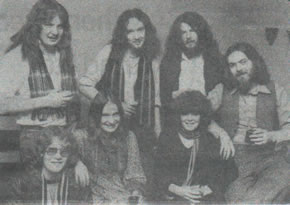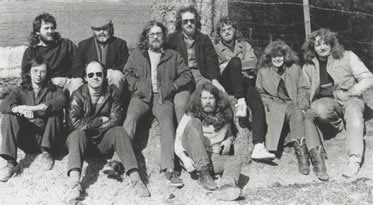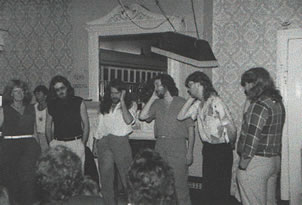Evolution
Up, Up and Away
 Pat, Ken and Mike join
Pat, Ken and Mike join
In 1979 a very intuitive Dave and Betty Verrill, who organised The Top House folk club in Marske suggested that we do a novelty
night at their club. The idea was that the whole family, including partners and children went along and sang some songs, maybe
doing the odd few as a massed choir. The net result was that Pat, Ken and Mike all found a natural place in the group where
they could either reinforce the melody, blend in with an existing or add a new one all together.
For the time being, we were now seven and enquiries to do bookings at both clubs and festivals started to flow in.
The next milestone event was going into the recording studio for the first time. We had become good friends with Jim Mageean
having met up with him at Whitby and several festivals up and down the country. In 1981 he and Joe Stead had
the idea of doing compilation album, using a mixture of north-eastern singers to record history of Tyneside women. Jim asked us
if we would like to put down four tracks of our own and contribute to the chorus for the whole album
Aall tegithor like the foaks o'shields not only turned out to be a great album, but also provided one of the epitaphs on our mam`s
gravestone over 20 years later.
It was our first real encounter with Joe Stead who was into project type albums at the time. He said that he would really like to
record us if we could come up with a suitable proposal. We immediately suggest that we felt that the songs of Graeme Miles, from
our native Teesside, hadn’t received the exposure they really deserved. To his eternal credit Joe bought into the idea straight
away and set us the task of getting Graeme on board, and selecting and learning the songs.
That is how we came to be in studio half-way up a snowy mountain in mid Wales in March 1983, where
Horumarye our first solo album was recorded.
 Pictured with Clive Gregson, Keith Hancock and Joe Stead
Pictured with Clive Gregson, Keith Hancock and Joe Stead
At about the same time we were also very active in singing up and down the country at dozens of fund raisers for the miners strike,
and also for the Hospice that was helping to look after Dad during his final illness.
We must have been gluttons for punishment in those days, though it was the opposite of gluttony that was the subject of our
next recording! Along with thousands of others were becoming increasingly appalled by the horrific images of the famine in
the "Horn of Africa", and the indifference of the West to do anything about it. We had become good friends with Keith
Hancock, who in turn introduced us to Clive Gregson. With their brilliant writing skills, and again supported by Joe
Stead, we were back in the studio in 1986 to record the single Third World War
The single sold very well, and along with a number of promotional concerts, we managed to raise a substantial amount
of money for the famine relief fund.
 Singing at Whitby Festival - 1986
Singing at Whitby Festival - 1986
Also at this time in 1986, we started another Folk Club back in Billingham at the Station, which we ran on a Thursday night
alongside the Collingwood on a Sunday night. We carried on running the two clubs in this way until the "wicked witch" from
the south paid a visit and did her famous "walk in the wilderness" after which our beloved Collingwood was raised to the
ground. The Thursday night kept on going and after moving from the Station back to the Smiths Arms for a second time, we
then moved the club to the Wellington Inn, in Wolviston Village just north of Billingham, where we still continue to run
it to this day.
For the next five years we concentrated on doing what we enjoy most – singing to live audiences at clubs and festivals.
We were no longer considered to be "the young kids on the block", but this had its compensations by having gained the
respect and friendship of many of the artists we had always considered to be the pantheon of the folk scene. We are
gratified to have had those friendships, many of which endure to the present, and we consider these to have been amongst
the greatest gifts that the folk scene has given us.